The slave narrative is a type of literary genre involving the (written) autobiographical accounts of enslaved persons, particularly Africans enslaved in the Americas, though many other examples exist. Over six thousand such narratives are estimated to exist; about 150 narratives were published as separate books or pamphlets. In the United States during the Great Depression (1930s), more than 2,300 additional oral histories on life during slavery were collected by writers sponsored and published by the Works Progress Administration, a New Deal program. Most of the 26 audio-recorded interviews are held by the Library of Congress.
The culture of Georgia has evolved over the country's long history, providing it with a unique national identity and a strong literary tradition based on the Georgian language and alphabet. This strong sense of national identity has helped to preserve Georgian distinctiveness despite repeated periods of foreign occupation.
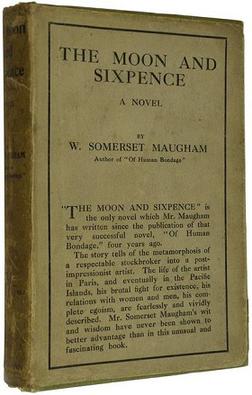
The Moon and Sixpence is a novel by W. Somerset Maugham, first published on 15 April 1919. It is told in episodic form by a first-person narrator providing a series of glimpses into the mind and soul of the central character, Charles Strickland, a middle-aged English stockbroker, who abandons his wife and children abruptly to pursue his desire to become an artist. The story is, in part, based on the life of the painter Paul Gauguin.

Corazón Salvaje is a Mexican telenovela produced by José Rendón for Televisa in 1993. In addition to breaking audience records in issue, it is one of the most memorable and most successful telenovelas of all time. It is the third television adaptation by Maria Zarattini, about the legendary love triangle between two young countesses, Monica and Aimée with the illegitimate son of a wealthy landowner, Juan del Diablo. The historical advisor for this telenovela was Jose Ruiz de Esparza who also advised the production of Alondra also starred by Ana Colchero in the title role.

The Counterlife (1986) is a novel by the American author Philip Roth. It is the fourth full-length novel to feature the fictional novelist Nathan Zuckerman. When The Counterlife was published, Zuckerman had most recently appeared in a novella called The Prague Orgy, the epilogue to the omnibus volume Zuckerman Bound.
The Patricide is a novel by Alexander Kazbegi, first published in 1882. The novel is a love story, but it also addresses many socio-political issues of 19th century Georgia. The novel portrays critical realism of the 19th century.

The Narrows is the 14th novel by American crime author Michael Connelly, and the tenth featuring the Los Angeles detective Hieronymus "Harry" Bosch. As Bosch crosses paths with FBI Agent Rachel Walling, the novel ties story elements left unresolved in The Poet and those from Blood Work and A Darkness More Than Night together into the Bosch mythos.
Whispers: The Voices of Paranoia is a narrative by Ronald K. Siegel. First published in 1994, it is a narrative about the extremes of phobias called paranoia.
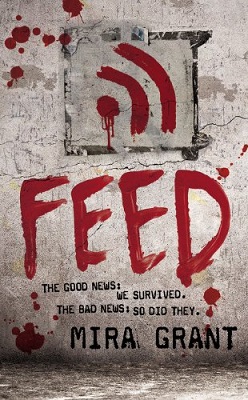
Feed is the first book in the Newsflesh series of science fiction/horror novels written by Seanan McGuire under the pen name Mira Grant and published by Orbit Books in 2010. Set during the aftermath of a zombie apocalypse and written from the perspective of blog journalist Georgia Mason, Feed follows Georgia and her news team as they follow the presidential campaign of Republican senator Peter Ryman. A series of deadly incidents leads Georgia and her brother Shaun to discover efforts to undermine the campaign, linked to a larger conspiracy involving the undead.
Bill Copeland was an American poet, writer and historian. He was born at the Emory University Hospital in 1946. He was raised in DeKalb County, Georgia and lived above his father's country store. During the 1970s Copeland earned his master's degree in rehabilitation counseling from the University of Georgia. Copeland has held many jobs throughout his life consisting of a probation counselor, a parole officer in Augusta, and also a disability adjudicator for people seeking social security in Atlanta. He then started his own private practice before retiring in 1995 at the age of 49. It wasn't until after his retirement that Copeland began to write. He was a member of the Georgia Writers Association, the National Writers Association, and Libros International. Copeland lived in Lilburn Georgia throughout his adult years. He died 19 October 2010 due to complications from liver failure. Bill Copeland is remembered by his wife, Kathy Copeland, as well as his daughter, Lily Copeland

Humsafar is a 2011 Pakistani drama telenovel based on the novel of the same name by Farhat Ishtiaq and directed by Sarmad Sultan Khoosat. It stars Fawad Khan, Mahira Khan, Naveen Waqar in lead roles and Atiqa Odho, Hina Khawaja Bayat, Behroze Sabzwari and Noor Hassan Rizvi in supporting roles.
Alex Cross is a crime, mystery, and thriller novel series written by James Patterson. The protagonist of the series is Alex Cross, an African-American Metropolitan Police Department detective and father who counters threats to his family and the city of Washington, D.C. Supporting characters include two of Cross's children, Damon, and Janelle, as well as his grandmother Nana Mama. The series is usually narrated in first-person perspective by Alex Cross, and occasionally from the villains' point of view in third-person.

A Man Was Going Down the Road is a novel written by Otar Chiladze in 1973. It was translated into English by Donald Rayfield in 2012.

The Book of Unknown Americans is a 2014 novel by Cristina Henríquez published by Knopf. The story is told from multiple first-person points of view, with the two main narrators being Alma Rivera, a 30-something housewife from Pátzcuaro, Mexico, and Mayor Toro, a teenage social outcast and first-generation American whose parents were originally from Panama.
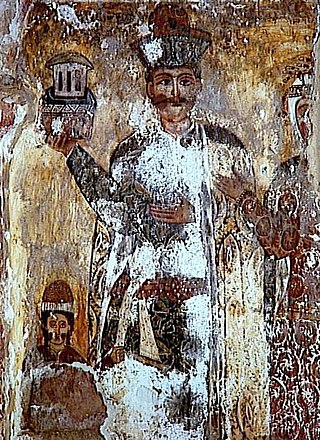
Levan I Dadiani was a member of the House of Dadiani and ruler of Odishi, that is, Mingrelia, in western Georgia. He succeeded on the death of his father, Mamia III Dadiani, as eristavi ("duke") of Odishi and ex officio mandaturt-ukhutsesi of Imereti in 1533. Dadiani's break with the king of Imereti brought about his downfall and imprisonment in 1546. He was able to escape and regain his possessions, securing Ottoman support for his independence from Imereti.
Giorgi III Dadiani was Prince of Mingrelia, of the House of Dadiani, from 1572 to 1573 and again from 1578 until his death. He was a son and successor of Levan I Dadiani.

The Underground Railroad is a historical fiction novel by American author Colson Whitehead, published by Doubleday in 2016. The alternate history novel tells the story of Cora, a slave in the Antebellum South during the 19th century, who makes a bid for freedom from her Georgia plantation by following the Underground Railroad, which the novel depicts as a rail transport system with safe houses and secret routes. The book was a critical and commercial success, hitting the bestseller lists and winning several literary awards, including the Pulitzer Prize for Fiction, the National Book Award for Fiction, the Arthur C. Clarke Award, and the 2017 Andrew Carnegie Medal for Excellence. A TV miniseries adaptation, written and directed by Barry Jenkins, was released in May 2021.
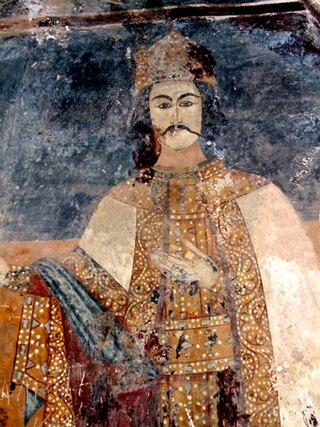
Levan II Dadiani was a member of the House of Dadiani and ruler of the Principality of Mingrelia in western Georgia. Levan is known for his extensive raiding of neighboring countries and taking hostages for ransom.

Georgian Museum of Fine Arts is a private art museum located on the Rustaveli Avenue in Tbilisi, Georgia (country). The construction broke ground in 2013 and is the only building in Georgia built purposely to house art exhibitions. The museum official opening was held on September 26, 2018, while it opened to the public on October 2, 2018. The museum houses over 3500 artworks, created by over 80 artists during the last 70 years. The museum exhibits private art collection of the family of Dr. George (Gia) Jokhtaberidze and Manana Shevardadze, founders of Magticom, the largest telecommunications company in Georgia.
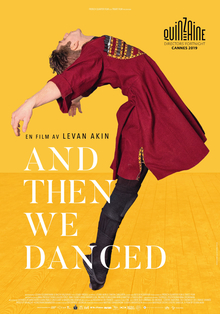
And Then We Danced is a 2019 Georgian drama film directed by Levan Akin. It was premiered in the Directors' Fortnight section at the 2019 Cannes Film Festival where it received a fifteen-minute standing ovation. It was one of the most favourably reviewed films out of Cannes that year. It was selected as the Swedish entry for the Best International Feature Film at the 92nd Academy Awards, but it was not nominated. Screening of the film in Georgia sparked protests, due to its portrayal of a gay love affair.













